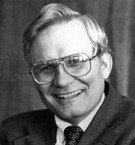
Dr. Feinberg hired Dr. Richard Rigsby for the Old Testament department in 1975, one year before he hired me full time. At the time Dr. Rigsby came, I was teaching part time in the department and still completing my doctorate. It quickly became apparent that Dr. Rigsby was a dynamic teacher who became popular among the students. He greatly admired Dr. Feinberg, and they became fast friends. He also wholeheartedly adopted Talbot Seminary (as it was called then) as his new home. Staunchly conservative in theology and politics, he was quick to express his firm convictions about nearly everything from the inerrancy of Scripture to the only proper way to pronounce biblical Hebrew. In his Hebrew classes he developed a Hebrew yell that incorporated vowels used in different forms of the verb. When the students shouted it in unison with great gusto it could be heard throughout Myers Hall.
A word that comes to mind when I think of Dr. Rigsby is “loyal.” He was loyal to the Lord Jesus; he was loyal to the Scriptures; he was loyal to his wife, Donna; he was loyal to his church; and he was loyal to Talbot and its students. Loyalty meant that he was not afraid to share his faith in Jesus or to share how the Scriptures shaped his life. In the early days we had a Hebrew class that required the students to read in Hebrew and analyze portions of Zechariah and Isaiah. Dr. Rigsby adopted Zechariah 4:6 as his life verse: “Not by might, nor by power, but by my Spirit, says the LORD of hosts.” Countless classes heard him expound on that verse in the Hebrew, and it also became a favorite sermon topic for him in many other venues. As for Donna, everyone knew he loved and cherished her deeply. He spoke of her fondly in class, in chapel, and among his friends and colleagues. Also, the church meant everything to him. One of his favorite activities was going to Disneyland; he would get a year-long pass and conduct board meetings for his church there. He was, however, also a loyal Southern Baptist; and when the Southern Baptists boycotted Disneyland, Dr. Rigsby immediately ceased going there. His firm support of Talbot was also clear to everyone, student and faculty alike. When some of his best friends on faculty left the school in the late 1980s to join another school in Sun Valley, Dr. Rigsby stayed and declared his loyalty to the president of Biola and the new dean of Talbot.
Another word that describes Dr. Rigsby is “enthusiasm.” He approached his classes with unbounded enthusiasm, and his joyful attitude was highly infectious to the students. He was very enthusiastic about the Scriptures. He taught them with gusto, confidently proclaiming their inerrancy and absolute authority. He was profuse in his praise of friends and colleagues, both to their face and in front of others. My most vivid picture of Dr. Rigsby’s enthusiasm is of how he led singing in chapel. I can still feel how my spirit soared in worship as he led us in Charles Wesley’s great hymn, “And Can It Be That I Should Gain?” Dr. Rigsby threw himself into this hymn in a way that embodied its bold and joyful message: “Amazing love! How can it be That Thou, my God, shouldst die for me?” He had a beautiful singing voice, and like a skilled conductor of a symphony orchestra, he helped us to sing the emotional nuances of that song. Every time I hear or sing it, I still picture in my mind Dr. Rigsby standing behind the podium in Calvary Chapel leading it.
For a third word to describe Dr. Rigsby, I will choose two: “pastor’s heart.” He prayed for the faculty and students regularly. Any time someone was hospitalized or dealt with a family member at the hospital, Dr. Rigsby would get there as soon as he could. He genuinely cared about all the faculty at Talbot and Biola, and it didn’t matter whether they disagreed with him about doctrine or school polity issues. When someone needed help, he was usually the first to arrive. He was so good at pastoral care for the faculty that he was appointed as pastor to the faculty at Talbot. And the thing I remember most about Dr. Rigsby and will always remember to my dying day is the pastoral care he showed me when my late wife spent her last three years battling cancer. When we were at the hospital, he was nearly always there. He was willing to take on an extra heavy teaching load so that I could have a lighter load. He prayed for us, visited us at home, and encouraged us from Scripture. That experience brought Dr. Rigsby and me closer together than we had ever been, and I will forever count him as one of my dearest friends.
So that is how I remember Dr. Rigsby today: loyal friend and colleague, enthusiastic follower of Christ and caring pastor. These characteristics remind me of Micah 6:8, a verse that encapsulates his life: “He has told you, O man, what is good; and what does the LORD require of you but to do justice, and to love kindness, and to walk humbly with your God.” Enjoy the place the Lord Jesus has prepared for you, Richard.
 Biola University
Biola University
.jpg)


.jpg)